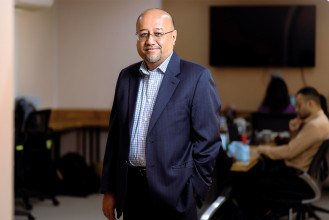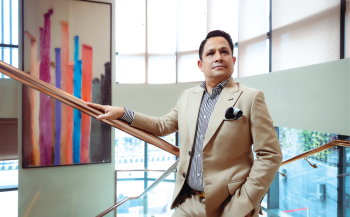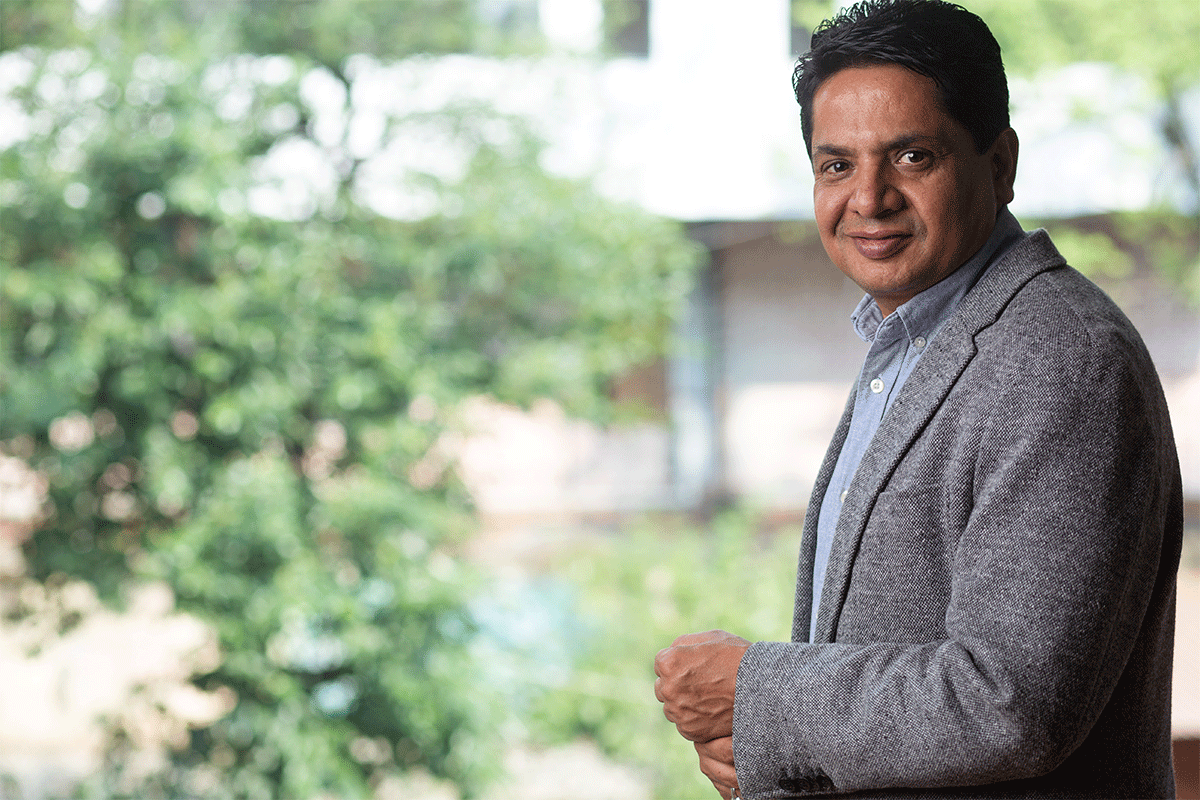
The tourism industry in Nepal has, for a great length of time, been considered to be a staple for the domestic economy. A nation built around the diversity of its fauna, flora, landscape and cultures, it is only logical for it to have become such an integral part of the Nepali way. The tourism and hospitality industries have not only been an effective as a foreign revenue earner but grown an industry that also provides jobs to tens of thousands across the country. However, despite the inherent value that tourism and hospitality carry for the nation, the industry also has its own set of shortcomings.
Skeptics question whether the revenue generated from the tourism industry trickles down to the community or does it only serve profit-driven companies? Is the industry environmentally sustainable? What kind of monetary gap does the luxury and local tourism market have? Has the industry truly achieved all that it claims to?
While these questions have sparked several debates, it becomes even more important at a time when it is an industry that stands hardest hit by the pandemic, and the thousands of employees who have been laid off or have been retained at a bare minimum salary question whether the owners could have down more to help them survive the angst brought on by the Covid 19 virus.
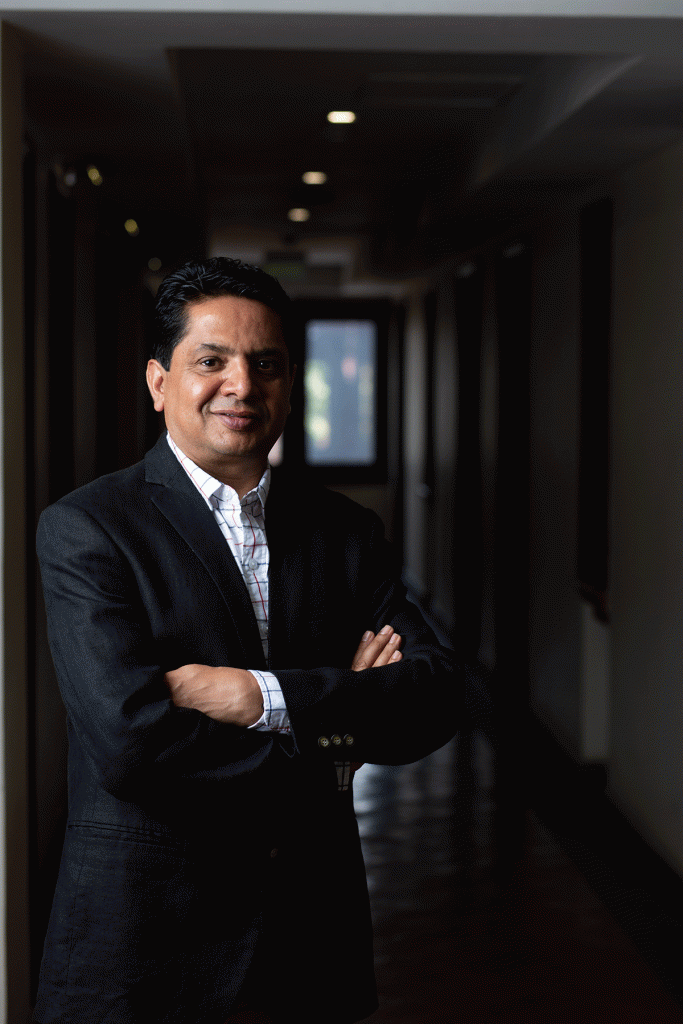
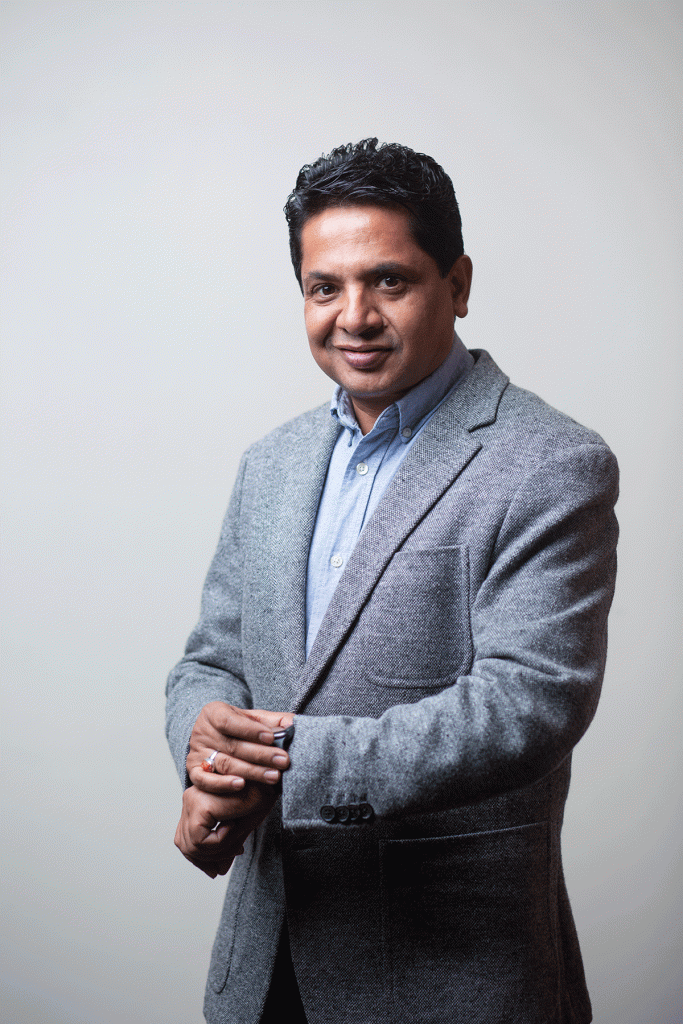
Who better to answer these tough queries than someone who has made a career out of working with and answering these very questions?
Shiva Dhakal, in his own words, is a man of the community. Born into an expansive household of 22 people, the tourism and hospitality entrepreneur believes that it is his large family that led him to developing a strong sense of faith and respect towards communities and the people that it is made up of. Dhakal further reaffirms that it is his conviction in the power of community that has been the secret sauce behind his illustrious career and business portfolio. Today, Dhakal successfully runs Royal Mountain Travel (RMT) which is a sustainable tour operator, two boutique hotels, a popular multi-cuisine restaurant called Bricks Café, and Inside Himalayas magazine, while also chairing the Community Homestay Network. What’s even more interesting is how Dhakal has managed to establish a system where all of his ventures -be it for profit or not- work in tandem and share a symbiotic relationship that benefits not just these enterprises but also the people that work in them.The origin
One cannot simply pour money into a venture and expect it to have a flying start. Rather than just monetary investment, a business requires a lot of contextual and industrial know-how to be able to survive. This holds true for all of Shiva Dhakal’s stints with the tourism and hospitality scene in Nepal. In fact, Dhakal’s relationship with the industry goes all the way back to when he was just a 17 year-old young man. A fresh SLC graduate, Dhakal had chanced upon a small gig at a hotel that paid a meager Rs 500. He zestfully recounts, “While I was promised five hundred rupees a month, they were so happy with me that they ended up paying me six hundred!” But like many first jobs, Dhakal didn’t stick around for much, and only two months later he was presented with yet another opportunity to work at a shop that rented out trekking equipment. Dhakal shares that it was here that he truly learned about the actualities of the tourism scene in Nepal. “At the time, Nepal received a lot of low-budget backpackers who would rent down jackets and trekking boots, and even water canteens on a day-to-day basis,” shares Dhakal. According to him, these were not luxury travelers, but rather explorers seeking to discover the real raw sceneries that Nepal had to offer. However, getting to know the tourists only answered one part of the equation. Dhakal quickly realised that in order to truly understand the tourism and hospitality industry in Nepal, one must also understand the realities of the people that act as the driving force behind it. And so, just a year and a half later, he started work with a trekking company. Dhakal shares, “I worked directly under the manager here, and with that, I got to understand how the trekking and tourism business really works in Nepal.” He further adds, “I also got the opportunity to trek. I actually got to travel to a lot of places from the east to the west of Nepal.” The now middle-aged Dhakal jokingly mentions that he does not think he would now be able to travel as much as he did during the prime of his youth. More importantly, Dhakal’s trekking trips across Nepal were not just fun and games. A Kathmanduite since birth, these journeys also proved to be a chance to really get to know more about the lifestyles of people across Nepal. “While traveling I had the chance to come across so many ethnic groups and culturally rich Nepali villages in remote regions, while also having to cater to clients who had come from their own vivid and alien nationalities. Interacting with these local communities and eating meals from their home kitchens showed me the hospitality they had, and opportunities they deserved,” states Dhakal, who firmly believes that this part of his career is what set in stone his love for people and the kaleidoscopic mix of cultures that they carry with them.
Finding balance
These experiences that Dhakal compiled eventually led him to establish Royal Mountain Travels (RMT) in 2005. He confides that the success that RMT enjoys today is not something that happened overnight. He even mentions that he was part of another venture before RMT, but while monetarily successful, Dhakal’s ambitions drove him to create something that was greater than the sum of its parts, something that was beyond investments and financial profits. Perhaps, it is because of this ambition that Dhakal believes that the success that RMT has enjoyed since its early days is solely because of the company’s willingness to take profits and reinvest it back to grow a system, a culture. He explains, “The whole success behind Royal Mountain is its people. We invest a lot of money in training our employees multiple times each year. Even for treks, we do not have guides, but rather we have trained them to become trek leaders. And this pattern of reinvestment is what led to the other ventures.” With a world of possibilities open to him, he expanded his business portfolio which now encompasses two successful boutique hotels and a hip restaurant. Prior to these enterprises, Dhakal was also able to start the Community Homestay Network (CHN) and Inside Himalayas magazine, both as non-profit entities created with the sole reason of helping Nepali communities. Inside Himalayas is a thoughtfully designed outlet that highlights travel tales from Nepal and CHN is a positive movement that economically enables hundreds of people in rural communities. Today, the companies that are within Dhakal’s elaborate array are able to not only function as independent entities but also work in perfect synchrony with one another. Dhakal elaborates that the necessity for tourism and hospitality in Nepal is not to create more tangible products to sell but to create and refine the experience that we already have hidden amongst our day-to-day lives. He contextually explains, “A tourist might want to visit Nepal based on the stories they saw and read on Inside Himalayas. When they do come to Nepal, they get to stay at either one of our traditional boutique hotels. After a Kathmandu tour perhaps they can enjoy a Thakali lunch at Brick’s Café, and while they’re traveling or trekking outside the valley, they can opt to have a ‘to-the-roots’ experience through our expansive community homestay network.”Creating adaptive business models
Of course, just because they work together does not mean they work in the same way. In actuality, while these enterprises do come together to create an entire package, they also have their own teams, targets, achievements and business models. Even the areas that these enterprises are based in create a variation in how they function. Dhakal explains, “Working in remote areas is especially challenging. Specifically, in terms of communication, infrastructure, and the cost to reach there which ultimately adds to the cost of product development. But even so, we are excited to work there because the people in these indigenous communities are more eager and invested as well.” As for the business end of things, not all of Dhakal’s ventures are designed to be profit-generating machines. “My business managers are never given financial targets.” Dhakal proudly claims. “The first thing I want from them is customer satisfaction. And the second is to reinvest our profit into developing products and services that are truly authentic.” For instance, Royal Mountain Travel, according to Dhakal, has always valued reinvesting in training their employees. He argues that while some might state that doing so would be pointless because employees leave the company, he believes that investing in their people does not just improve skillsets but it also strengthens the company’s relationship with them even if they do part ways in the future. He recounts, “A while back, a longtime employee sought to quit his position to start a business of his own. When he asked us if we were okay with it, we fully supported his decision to move on. Fast forward to the present day, while we were looking to reduce plastic use at Brick’s Café, we were able to source premium but affordable biodegradable packages from the business that our former employee had started.” On the other end of the spectrum, Community Homestay Network started life as a simple CSR initiative through RMT in 2012, but following the success of the initial years of the program, CHN was able to establish itself as an independent entity that is fully dedicated to creating more opportunities in rural communities. What followed was even more good news for the newly independent CHN when it was able to secure a €225,000 grant through booking.com. This has only further extended CHN’s capability to maintain its 17:3 profit sharing ratio where 85% of the company’s earnings go back to homestay owners, while a minimal 15% of it is to run the office. What’s more is that these homestays are completely independent of CHN and by no means have to solely rely on CHN for clients. Dhakal says, “The goal for CHN is to establish a steady financial source for rural communities so that one day, even if CHN is not there, these communities will still be able to make a living for themselves.” Similarly, Inside Himalayas was started when he witnessed a lack in the market for authentic stories that truly covered the vast variety of landscapes that Nepal had to offer. “Back in 2012, we realised that there wasn’t a lot of quality content that covered Nepal online. And even today it is difficult to actually hunt down authentic information about the country,” shares Dhakal. He says, “When we market our hotels and homestays, all we can do is highlight photographs of our rooms, bathrooms, and lobbies. What we can’t do is showcase the actual authentic experience that travelers get when they come to Nepal.” Inside Himalayas fills that gap by creating content that showcases the authentic experiences a visitor can have.
Tourism that promotes sustainability, empowerment and conservation
At the heart of Shiva Dhakal’s ventures is one crucial ingredient - ‘sustainability.’ Dhakal remembers an experience from his teenage trekking days, “When we went trekking, we used to carry all these things from Kathmandu, items like Italian pasta sauce, garlic, and much more. This in my mind raised the question, what were the local communities getting if we brought everything we needed from the valley? We would hardly pay them something like five rupees for firewood and twenty rupees to use their kitchens. So, when you really think about how much the tourism industry was actually benefitting local communities, the answer really wasn’t much.” A young Dhakal came to realise that not only were local communities being cheated from the chance to grow their economic worth, their local goods and products were also wasted without buyers. Since then, Dhakal has made it a personal and corporate mission to practice environmentally and economically sustainable practices in all of his ventures. Take into account how CHN has been pushing forward as an active agent for women empowerment and financially self-sustaining rural communities. Dhakal shares, “85% of all the homestays in our network are owned and operated by women. The main target behind this is to create an environment that allows women to have a decision-making role within their families. We also require homestay owners to open mandatory bank accounts that we recommend to be opened under the matriarch’s name. This not only promotes savings but also gives women leverage when it comes to the matter of household finances.” Dhakal’s quest for sustainability in tourism and hospitality is not just limited to social welfare and local economics; it is something that is even practiced in his more upmarket enterprises. Even as we converse, Dhakal points towards an aesthetically pleasing glass bottle on his table and shares that his hotels and restaurants avoid single-use plastics in favor of reusable items such as refillable glass bottles and environmentally friendly takeaway packages. “While we do offer guests mineral water, we strongly encourage them to use our refill bottles through high markups on single-use plastic bottles,” he shares. Even the general aesthetics of his hotels and restaurant play their part in acting as an instrument for cultural conservation. Dhakal’s hotels and restaurant indulge in traditional Newar design cues that are not just appealing to the eyes but also vouch for the promotion of indigenous culture. Dhakal strongly believes that despite its initial costs, sustainability is the way to go. Not just for the sake of our communities and environment, but also for the tourists that visit us. He shares, “More and more travelers are becoming concerned with where their money is being spent in. These people want to support local people and not just have their money go to large multi-national profit-driven organisations.” He says that even small measures such as going electric for small vehicles or ensuring that half of your drivers are women does a lot in the long run.Towards a better future
It is no secret that the past year has been an exhausting one. This holds true for Dhakal’s ventures and the tourism and hospitality industry. What was once a thriving industry that put food on the tables for tens of thousands of families came to a screeching halt with two national lockdowns and an international travel ban. Suddenly the revenue stopped. Empty hotel lobbies and the woes of homestay owners became difficult to bear. Dhakal rose to the challenge. He says, “For community homestays, there are no travelers and hence no income which does not sit well with us because we were the ones who convinced them to invest in homestays in the first place. As soon as the pandemic hit, we started to bring the local products from these areas to Kathmandu. For instance, if a homestay owner in Chitwan also raised ducks, then we were able to buy it from them as ingredients for Brick’s Café.” Other actions include CHN training locals to produce handicrafts in conjunction with booking.com, vacuum sealing fish from communities for use rather than importing from Vietnam, and packaging and marketing grains and produce grown by homestay owners. As for his hotel teams in Kathmandu, Dhakal is working with them to prepare new experiences and plans in order to make a comeback when the pandemic ends. As an experienced business man he knows that sustaining these ventures for the next few years to fully recover from the difficulties they have had to deal with in the past year will play priority in the days to come. But the entrepreneur in him cannot stay dormant and he is also working to launch a brand-new wellness center by the name ‘Avata’. Shiva Dhakal is committed to ideas of innovation, diversification and creating exciting new experiences for travelers with his products even as he builds on the foundation of sustainability and community.
Published Date: May 29, 2021, 12:00 am
Post Comments
E-Magazine
RELATED In the Lead


-1767340083.jpg)
